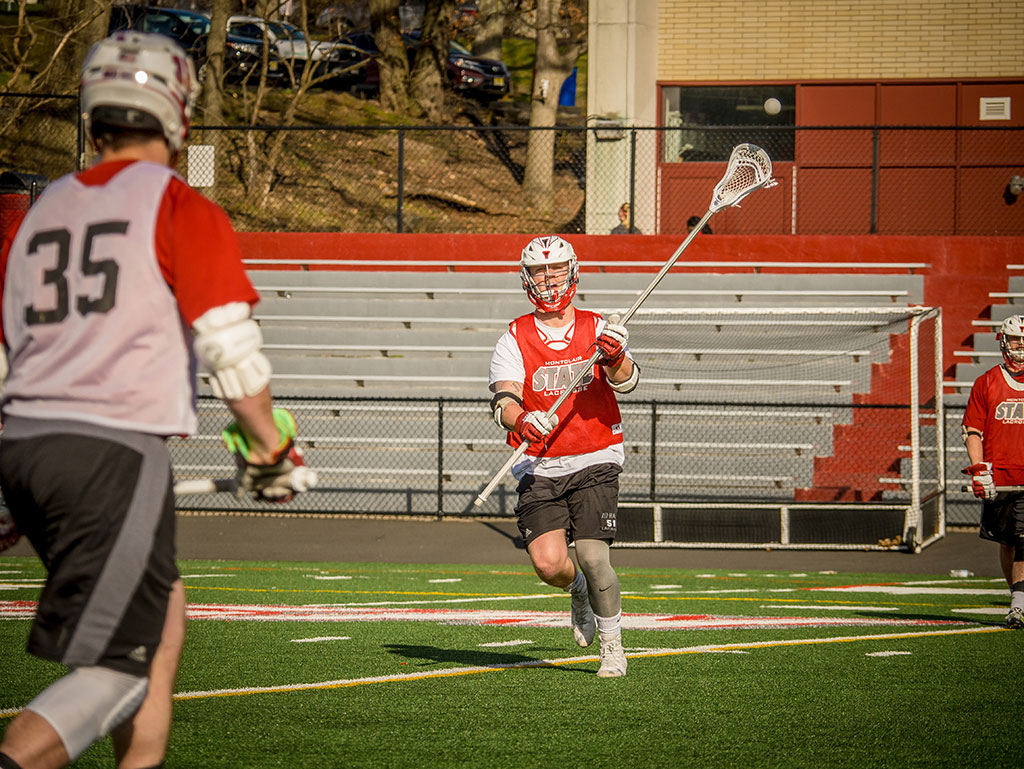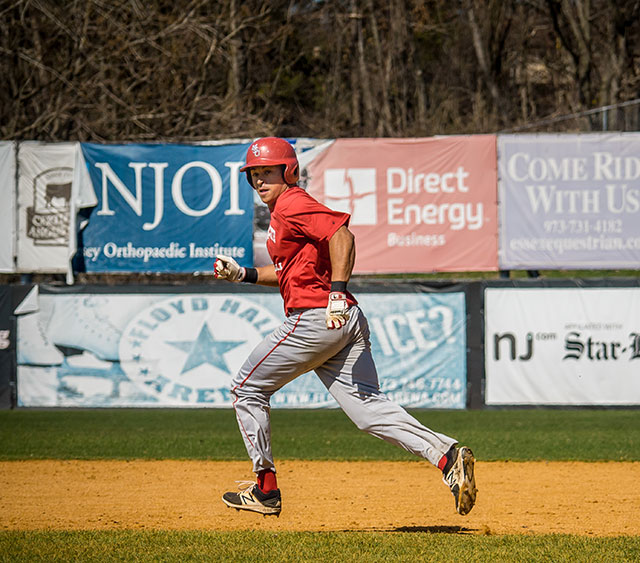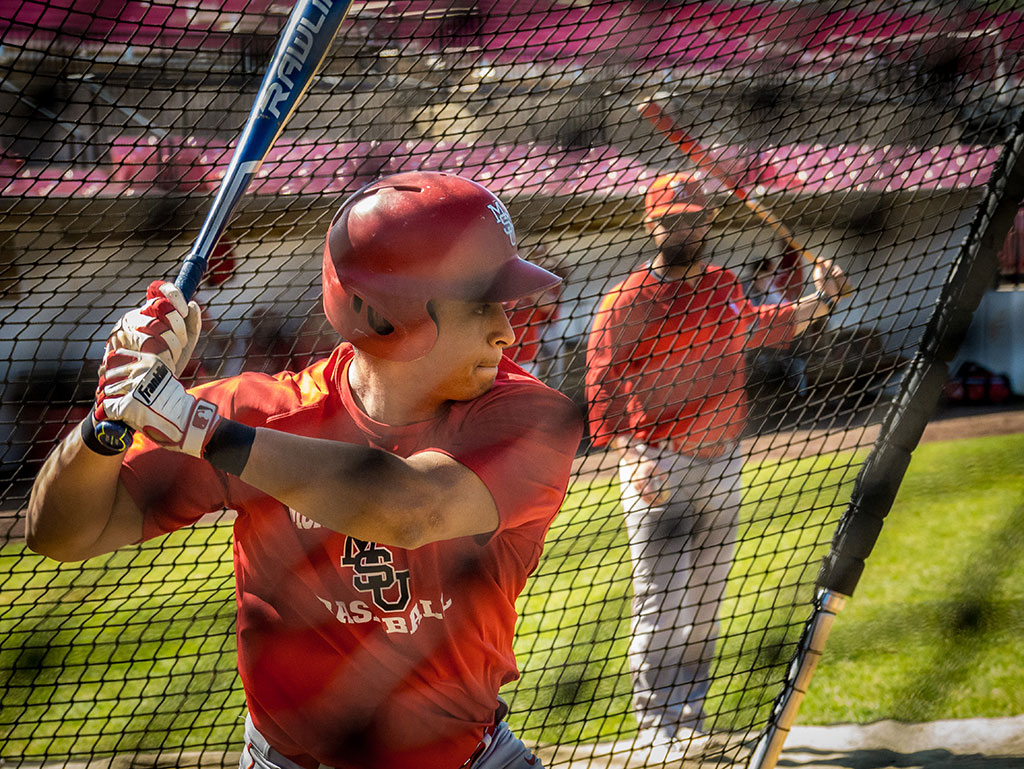
Soldiers’ Fields
After serving their country, military veterans walk on to spring teams and serve as leaders for younger players.
Max Frankovitz
Veterans Max Frankovits (lacrosse) and Jesse Baiza (baseball) walked on to their teams and have proven to be leaders.
Max Frankovits arrived home from military service with a rod, two plates and seven screws in his forearm, and without any idea of where life would take him next. He never imagined that he wouldn’t be able to finish his contract with the U.S. Army – or that an injury would force him to leave behind his fellow soldiers and find a new direction.

“I had no idea what I wanted to do when I got home,” the 21-year-old Little Falls, New Jersey, native says. “I looked into trade schools. I looked into becoming a firefighter. I looked into certificate programs. I was completely lost.”
That’s when a good friend made a suggestion and then, more importantly, helped him make a connection. Why didn’t Frankovits, who played lacrosse for Passaic Valley High, embrace the sport he loved again as a college athlete? And why not do it just a few miles from his childhood home for Mike Schambach’s program at Montclair State?
What happened next is a relationship that has benefited everyone. Schambach, in his third year as the team’s head coach, added a mature leader to his team as a walk-on who could share his life experiences with his younger teammates who might be living away from their families for the first time.
“He’s been a great addition to our team,” the coach says.
And Frankovits? He found a reason to charge out of bed in the morning. Not only is the self-described “terrible student” in high school taking advantage of the GI Bill as he pursues a degree in business administration and accounting, but he is committed to setting an example on the playing field as the team tries to become a national title contender.
Life threw me a curveball and I swung and missed, but I got up the next at-bat and got a base hit.
“It all worked out very, very well, because this is my home now,” Frankovits says. “This is my family. One of the coaches told me, ‘I would be happy knowing you’re the worst kid on the team because I know you’ll give it 110 percent all the time.’ And that’s part of our soldier’s creed. We never give up, ever.”
Military veterans are a small subset of the 460,000 student athletes enrolled at colleges across the country, according to the NCAA. The anecdotal evidence, though, shows that increasing numbers of former soldiers – including 153 at Montclair State – are using the GI Bill to attend college. And some of those veterans are picking up the bats and gloves that they left behind to serve their country.

At least two of them are Red Hawks. Like Frankovits, Army veteran Jesse Baiza never expected he would end up on the campus at this stage of his life. He graduated from North Bergen High School in 2011 and had interest from several colleges with prominent Division I programs, including Seton Hall, Virginia and Coastal Carolina. But he lacked the SAT scores and grade point average necessary to land a coveted scholarship. He enrolled at the County College of Morris instead, but the long commute to the Randolph campus from his Hudson County home became too costly and time consuming. He was about to begin looking for a job when a friend encouraged him to enlist in the Army for a new start. “It was my best option,” Baiza says.

Soon, he was in Fort Benning, Georgia, going through the rigors of basic training. He didn’t know what his new life had in store for him until 2014, when he deployed to As Sayliyah Army Base in Qatar on a security mission – parts of which are too classified to discuss. He had plenty of time to think in a place he described as “the middle of the desert.”
Baiza returned to New Jersey in 2015 and started taking classes at Kean University, pursuing a degree in criminal justice, but the itch to play baseball wouldn’t fade. The coaches at Kean made it clear that he was wasting his time trying to walk on to their team, so a friend steered him toward a fresh start at Montclair State.
Coach Jared Holowaty knew that Baiza was a talented high school player, but after several years away from the daily grind of the sport – and with a more muscular frame than the skinny kid who enlisted – he faced a big adjustment. But Holowaty liked the idea that he could bring in a player who, while technically a freshman, was a 25-year-old with real-life experience and maturity that could rub off on his younger teammates.

There was, of course, the predictable round of questions about his service. “They would ask, ‘What did I see? Did I kill anyone?’ Stuff like that,” Baiza says with a laugh. But soon, when the novelty of having a soldier sharing their dugout wore off, he could make himself available for more serious conversations about life.
“I want them to know they can see me as a mentor if life throws them a curveball,” he says. “Because that happened to me. Life threw me a curveball and I swung and missed, but I got up the next at-bat and got a base hit.”
Baiza still has to juggle his responsibilities with the National Guard, but his superiors have helped arrange his schedule around the important parts of the baseball season. He is under contract through 2019 and will face a decision: Should he reenlist or chase his baseball dream professionally? Or complete his degree and find a job in a national security-related field?

For now, he is content to be a leader in the clubhouse. Baiza, who is a junior academically, wants to become the first member of his family to earn a college degree. His journey might have taken a 7,000-mile detour from New Jersey to the deserts of the Middle East, but that will make reaching the destination even more worthwhile.
Frankovits isn’t thinking that far ahead. Part of the adjustment to attending college was allowing himself to be a young person again, to embrace what is right in front of him instead of worrying about the bigger decisions that he’ll face years down the road. He wants to embrace it all during this lacrosse season, and in the process, prove to his new teammates that he is worthy of being their captain.
There are days, he admits, when it isn’t easy to get motivated for workouts on the lacrosse field that are far more difficult than the ones he faced in the military. But then he remembers the journey that led him here and the lessons he learned from this last team, and rededicates himself to working twice as hard.
“I think back to that kid back in seventh, eighth grade, that little kid in the backyard who would stay out with his brother until it was dark out,” Frankovits says. “And I think, would that kid be okay with your quitting right now? Absolutely not. I want to make my family proud. I want to make myself proud.”